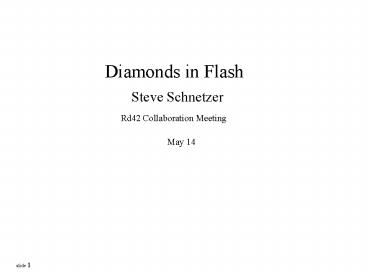Diamonds in Flash - PowerPoint PPT Presentation
1 / 20
Title:
Diamonds in Flash
Description:
atmosphere to the energy loss of particles in EM shower ... SLAC 28 GeV beam into alumina target. measure fluorescent yield after. 2X0, 6X0, 10X0 and 14X0 ... – PowerPoint PPT presentation
Number of Views:15
Avg rating:3.0/5.0
Title: Diamonds in Flash
1
Diamonds in Flash
Steve Schnetzer
Rd42 Collaboration Meeting
May 14
2
The Flash Experiment
Measure to 10 the fluorescence response of
the atmosphere to the energy loss of particles in
EM shower
Needed for calibrating energy response of cosmic
ray fluorescence detectors
- SLAC 28 GeV beam into alumina target
- measure fluorescent yield after
- 2X0, 6X0, 10X0 and 14X0
- 14 day run in June plus shorter run in July
3
Purpose of Diamonds
Use GEANT to get
- Total particle yield
- Lateral particle distribution
- Particle spectrum
downstream of target
Use diamond detectors to verify GEANT calculation
- lateral distribution
- of energy deposit
relatively easy
- absolute measurement
- of energy deposit
relatively hard
calibration
4
Parameters
- Beam 28 GeV electrons
107 e? /pulse
10 Hz
pulse duration 1 ps
- Use four 1 cm x 1cm CD 100 series diamonds
- Diamonds centered at x 0cm, 5cm, 10cm, 15cm
- perpendicular to beam
- Measure shower at 2X0, 6X0, 10X0 and 14X0
5
Diamond Segmentation
3 x 3 pixel array
active area 8 mm x 8 mm
pixel 2.6 mm x 2.6 mm
outer ring for defining fiducial region
segmented to help assure full beam flux hits 3x3
region during calibration
6
Ganging
at x 5 cm ganged to 3 strips
at x 10 cm 15 cm ganged to 1 pad
7
GEANT Simulations
x 0 cm
energy deposited
6X0
2X0
8
GEANT Simulations
x 0 cm
energy deposited
14X0
10X0
9
Charge Deposited
charge deposited in central pixel
Depth Charge
2X0 2.0 x 10?7 C
6X0 1.5 x 10?7 C
10X0 2.6 x 10?8 C
14X0 3.2 x 10?9 C
charge for 1 mip 2.0 x 10?15 C
this charge deposited in 1 ps
assumes 13 eV per e-h pair
10
Calibration
- Calibrate linearity of response of diamond to
- large total charge deposition
- high ionization density
- Use ? 1 mm beam with target out 107 to 108 ppp
- to map out linearity of response
beam toroid provides precision intensity
measurement
- Decrease beam density by factor of 2 (? 2 mm)
- to see how diamond response depends on
- ionization density
11
Energy Deposit
peak density (C/mm?2)
2x0
6x0
Compared to CERN
10?8
5 x higher peak density
10x0
2 x more charge
in 30 ns
104 x faster deposit
107 on thick target
10?9
1 mm beam (target out)
2 mm beam (target out)
CERN BCM test
14x0
10?8
10?7
charge on central pixel (C)
12
Readout Scheme
one for each pixel
diamond
Cd
Rb
Cb
Vb
I
Cs
Rs
50 ?
ADC
100 ns shaping
- VbCb gtgt 10?6 C
Cs 20 nF
?
- Q/Cs ltlt Vb
Rs 5 ?
- RsCs 100 ns
Cb 400 nF
- RbCb ltlt 0.1 s
Rb 2.5 k?
13
Inductive Voltage Drop
charge in diamond is collected in about 10 ns
2 x 10?7 C charge deposited
? 20 A over 10 ns
this current wants to turn on in 1ps the bunch
length of the beam
- large inductive voltage drop
- voltage on diamond sags
? PC board has to be designed to minimize
inductance
14
Inductance
inductance a problem here
causes voltage across diamond to sag
Cd
Rb
Cb
Vb
I
Rs
Cs
diamond
- wire bond wire and PCB trace about 1 nH per mm
- use multiple wire bonds and traces
- should be able to keep inductance less than 5 nH
15
Spice Simulation
voltage on diamond
input rise time 1 ps
1 nH
5 nH
10 nH
voltage sags about 400 V for 1 to 2 ns
16
PC Board
Cd
Rb
on ganging board
Vb
Cb
I
Rs
Cs
on board
caps as close to diamond as possible
Cb on backside
can have 1 cm ? hole here
signals routed by flat cable to ganging board
bias line
17
X/Y Stage
40 cm arm to keep stages out from behind
optical box backscattering
29.5 cm
18
Readout
Ganging Board
Diamond PC Board
one for each diamond
flat signal cable
- shaping resistors
- ganging of signals
a few feet
bias coax
coax signal lines
from control room
to control room
19
Issues
- absolute calibration of energy deposit
- calibrate with direct electron beam
- effect of ionization density
- vary density and intensity of electron beam
- inductive effects
- minimize inductance 5 nH ? 400 V sag over 1 ns
- low energy and stopping electrons
- need precise GEANT calculation
- neutron background
- current build up
- radiation damage
- on average 2 x 1013 e? cm?2 hr?1 in central
pixel - well measure it
20
Challenges
- 2 times more charge per pulse
- than anything previous
- 5 times greater ionization density
- than anything previous
- Very rapid 1 ps energy deposit
- First attempt at a few measurement
- (10 is the standard)



























![Lecture note : Gas chromatography [1] ????????? PowerPoint PPT Presentation](https://s3.amazonaws.com/images.powershow.com/4420183.th0.jpg?_=20131029062)



